Coordinación
Una coordinación sólida puede evitar vacíos y duplicaciones en las respuestas humanitarias, así como garantizar que los PTM complementen otros tipos de asistencia. Sin embargo, el informe del «Estado Global de los Programas de Transferencias Monetarias» de la CALP Network muestra que la coordinación de la asistencia en efectivo es vista como débil y ad hoc, y que esto está teniendo graves repercusiones operativas.
Los donantes, las ONG y los líderes de los grupos de trabajo de transferencias monetarias (GTM) han pedido claridad sobre tres temas principales relacionados con la coordinación de la asistencia en efectivo:
- Quién debe ser responsable de asegurar una coordinación eficaz de la asistencia en efectivo;
- Cuál es la función y el mandato de los grupos de trabajo de transferencias monetarias, incluso en relación con las transferencias monetarias multipropósito;
- Cómo se debe dotar de recursos a la coordinación de asistencia en efectivo.
Tenemos que basarnos urgentemente en lo que funciona y proporcionar claridad a nivel mundial sobre las preguntas arriba mencionadas, adaptándonos a los diferentes contextos. Hace mucho tiempo que se deberían haber tomado decisiones claras basadas en necesidades operativas y no en la política de las agencias.
Prioridades actuales
El objetivo de la CALP Network es contribuir a seguir progresando en este tema en tres niveles: apoyar a los grupos de trabajo de transferencias monetarias a nivel regional; contribuir a soluciones prácticas para la coordinación de la asistencia en efectivo a nivel mundial; y convocar una discusión basada en la evidencia sobre temas clave, destacando puntos de decisión críticos y oportunidades de progreso.
Contenido destacado

Cash Coordination Tip Sheet
Guidelines and Tools
This tip sheet sets out established best practice, key guidance and resources for all aspects of cash coordination, intended as a clear, accessible and action-oriented guide for those engaged in coordination of cash and voucher assistance (CVA) at the field level.

Introducing the Cash Coordination Tip Sheet
Webinar
The CALP Network has developed a tipsheet setting out established best practice and key guidance and resources for all aspects of cash coordination, intended as a clear, accessible and action-oriented guide for those engaged in coordination of cash and voucher assistance at the field level.

Cash Coordination: A proposal from members in MENA
Blog Post
Earlier this year the CALP Network undertook regional consultations to explore options for cash coordination. This blog lays out recommendations from participants from the Middle East and North Africa who sketched out what cash coordination, and coordination more broadly, could look like in future to support a more effective, efficient and accountable response.
Últimos recursos
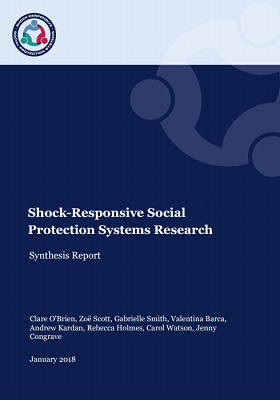
Shock Responsive Social Protection Systems Research: Synthesis Report
Report
This synthesis report consolidates the evidence and lessons learned from the research, drawing on all the case studies and other outputs, including the literature review as well as policy briefs on systems development and monitoring and evaluation. It highlights the key ways in which social protection...

Transfer Values in Kenya’s National Social Security System
Report
This report, commissioned by the World Food Programme (WFP) and United Nations Children’s Fund (UNICEF) seeks to examine the current transfer values of Kenya’s tax-financed social security schemes and assess whether they are set at an appropriate level. Transfer Values in Kenya’s National Social...

Cash-Based Programming in South Sudan
Report
This rapid review provides a synthesis of evaluations and learning reviews of cash-based programming in South Sudan. There is evidence that in South Sudan the cash-based programming help poor households address food needs and nutrition; and by injecting funds from vouchers, paid work, or grants into the...

Lessons Learnt and Recommendations for Cash-for-Shelter Programmes in the Democratic Republic of Congo
Report
This document provides an overview of how cash and voucher assistance is being used by shelter partners in DRC and details the lessons learnt to-date. It goes on to put forward recommendations and opportunities to strengthen cash and market-based programming in the shelter/housing sector there. An...
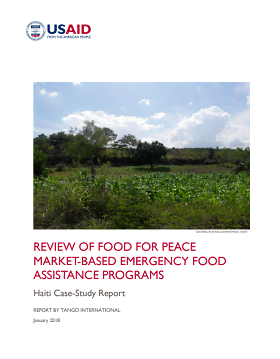
Review of Food for Peace Market-Based Emergency Food Assistance Programs: Haiti Case-Study Report
Report
Haiti is a very low-income country with a degraded ecological setting that faces repeated threats from multiple hazards. It is an excellent example of Food for Peace (FFP) linking emergency and development funding through the Kore Lavi Title II program that serves as a model for the national social...
Sudan Cash Working Group meeting minutes 12 December 2017
Report
Sudan Cash Working Group meeting minutes 12 December 2017
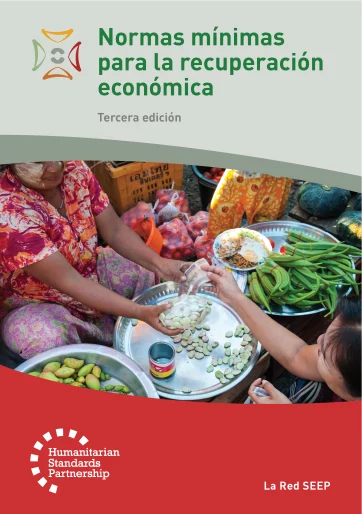
Normas mínimas para la recuperación económica (MERS)
Guía y herramientas
Las Normas mínimas para la recuperación económica (MERS, por sus siglas en inglés) son el consenso reconocido internacionalmente sobre las mejores prácticas para desarrollar la capacidad de recuperación económica de las comunidades afectadas por la crisis. SEEP desarrolló y refinó el MERS durante...

Inter-Agency Joint Cash Study: Market Functionality and Community Perception of Cash Based Assistance – Yemen
Report
Since 2015, conflict in Yemen has left 3 million people displaced and over half of the population food insecure, and has destroyed much of the country’s infrastructure. As of July 2017, much of the population had lost their primary source of income, 46% lacked access to a free improved water source and...
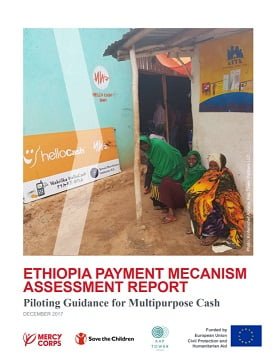
Ethiopia Payment Mecanism Assessment Report
Guidelines and Tools
Humanitarian organizations today are facing unprecedented challenges in addressing crises in the Middle East, Africa and across the world. The crises are both urgent and, in many cases, protracted in nature; the varying scenarios have driven the need to better understand how to select the modality of...
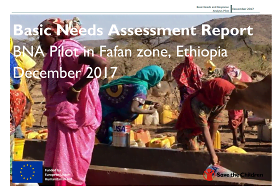
Basic Needs Assessment Report BNA Pilot in Fafan zone, Ethiopia
Report
The BNA in Ethiopia identified Tuliguled as the woreda where deprivation across all basic needs has the most severe humanitarian consequences for the population in the assessed sites . Babile and Kebribeyah were the next most affected. This situation was due mostly to insufficient purchasing power and...

The CALP Network’s Cash Learning Hub is Now Live!
Blog Post
The Cash Learning Hub is a one-stop-shop for Cash Transfer Programming (CTP) learning and training resources, and our course catalogue has over 30 resources in English, French Arabic, and Spanish. By partnering with the Humanitarian Leadership Academy, the CALP Network is able to bring its course...

Geneva-based cash working group – Minutes from 13 November 2017
Guidelines and Tools
Geneva-based cash working group – Minutes from 13 November 2017

Terms of Reference – The Ethiopia Cash Working Group – November2017
Report
The Ethiopia Cash Working Group (ECWG) is a forum of stakeholders dedicated to improving the use and delivery of cash and voucher transfer programming in Ethiopia The overall objective of the group is to strengthen the coherence and quality of cash based interventions (CBIs) in Ethiopia through...
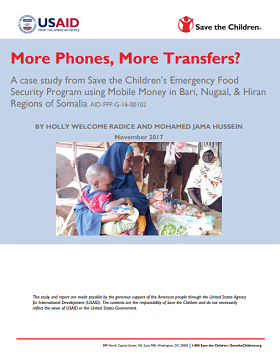
More Phones, More Transfers? A case study from Save the Children’s Emergency Food Security Program using Mobile Money in Bari, Nugaal, & Hiran Regions of Somalia
Report
In 2016-2017, with funding from USAID/FFP, Save the Children implemented a project targeting over 10,000HH the Bari, Nugaal, and Hiran regions of Somalia with monthly cash transfers using Mobile Money a partnership with Golis and Hormuud. The project sought to improve the food security situation in the...

Organizational Cash Readiness Tool (OCRT)
Guidelines and Tools
This set of tools and documents guides practitioners through a process of strengthening their organization's capacity and readiness for cash and voucher assistance (CVA).
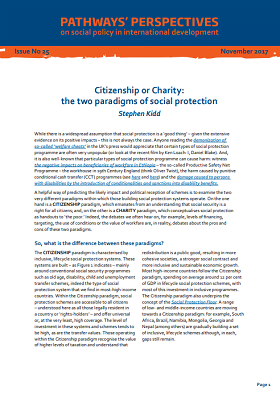
Citizenship or Charity: the two paradigms of social protection
Report
This report compares and evaluates two paradigms of social protection. Stephen Kidd explores the assumptions behind, and impacts of, the citizenship and charity paradigms he argues are at work in different contexts.

Market Systems in Libya: Assessment of the Wheat Flour, Insulin, Tomato and Soap Supply Chains
Report
The Market Systems in Libya assessment aims to provide humanitarian organisations with a better understanding of market dynamics in Libya, information on key supply chains and how they have been impacted by ongoing conflict, and the necessary foundation to examine the potential of scaling up market and...

Marco Global Para la Acción
Guía y herramientas
Este marco proporciona un resumen consolidado de los principales compromisos y recomendaciones hechas para mejorar los programas de transferencias monetarias† en la respuesta humanitaria durante 2015 y 2016. Agrega el contenido central de: la Gran Negociación (Grand Bargain), los 10 Principios de ECHO,...

UNHCR Multi-Sector Market Assessment (MSMA): Charcoal, water, low-income rental housing and core-relief items in Maiduguri, Jere and Konduga, Borno State, Nigeria
Report
To assess the capacity of markets to respond to cash based initiatives (CBI), including multi-purpose cash grants (MPG), the UNHCR Multi-Sector Market Assessment (MSMA) was piloted in Maiduguri Municipal Council (MMC), Jere and Konduga Local Government Areas (LGAs) of Borno State, Nigeria in July 2017....

Guidance and Toolbox for the Basic Needs Analysis
Guidelines and Tools
The Basic Needs Analysis (BNA) is a multi-sector needs analysis approach that can be applied in both sudden onset and protracted emergencies. The methodology comprises the Guidance (this document) presenting the conceptual BNA framework and related processes, and a Toolbox, which
includes tools,...